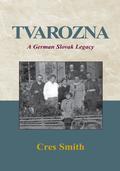In 1926 Pauline Klug, had an opportunity to visit her family living in Eastern Europe. Her mother had been informed that Paulines grandmother was dieing. She and her mother, Wilma Klug, traveled to Tvarozna (Var-oz-na) to see her before her death. Tvarozna is a village in Slovakia lying in the shadows of the Carpathian Mountains. The impending trip to Eastern Europe brought to remembrance the younger lives of Wilma and Cornell in Tvarozna and Poprad, Slovakia. Wilma Bullner and Cornell Klug lived twenty miles apart and were third cousins. Although they lived close, they were not acquainted as young people in 1895. As a girl, Wilma spoke Slovak and German and found work as a language teacher. Before the 1st World War Tvarozna was known as Durand, a village of the Spis, mostly populated with Germans whose families had formed the village during the 15th century. Cornells family lived in Poprad and this is where Pauline spent most of her time while in Europe. Paulines grandfather, Gustav Klug, was in the construction and other business ventures. His fathers business was one Cornell desired; but his older brother, Emile, was to inherit the business from Gustav. Cornell was apprentinced to a tailor. Cornell and Wilma immigrated to America at different times, around 1901. They met and married in Philadelphia. While in Philadelphia and during the roaring twenties they operated a delicatessen. Pauline grew up with two brothers, Erwin and Louis.Pauline enjoyed an especially fond relationship with her brother, Louis, as they danced for fun and competition and enjoyed the same friends. Wilma left for Europe, leaving Cornell behind with her two boys to help Cornell in the store. While Wilma was in Europe, Cornell sold the store and took a job as an insurance salesman. When Wilma returned from Europe she was understandably upset and took Cornell to task for selling the store. Later, Cornell purchased a gasoline service station and Pauline spent late hours with h
-
- Categories
- Other
- Australia
- China
- New Zealand
- United States
- United Kingdom
- France
- Spain
- Italy
- Turkey
- Germany
- Malaysia
- Mexico
- Austria
- Russia
- Ukraine
- Thailand
- Saudi Arabia
- Greece
- Canada
- Poland
- Netherlands
- Singapore
- Hong Kong
- Taiwan
- South Korea
- Japan
- Brazil
- Argentina
- Indonesia
- Vietnam
- India
- Morocco
- South Africa
- Tunisia
- Zimbabwe
- Algeria
- Kenya
- Egypt
- United Arab Emirates
- Syria
- Jordan
- Iran
- Israel
- Qatar
- Dominican Republic
- Chile
- Puerto Rico
- Peru
- Uruguay
- Costa Rica
- Mauritius
- Sweden
- Nepal
- New
- Popular
- Gifts
- Videos
- Help / Contact Us
- Terms & Privacy
- What is TripTerest


